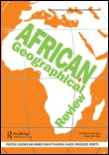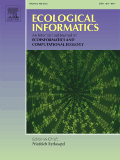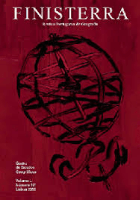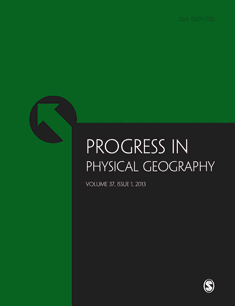
Physio-Geo
Scope & Guideline
Empowering Insights into Earth-Surface Processes
Introduction
Aims and Scopes
- Environmental Impact Assessment:
Research in this area evaluates how various environmental factors, such as water quality and biodiversity, are affected by human activities and natural processes. - Remote Sensing and GIS Applications:
The journal frequently publishes studies utilizing remote sensing technologies and Geographic Information Systems (GIS) to analyze land use, vegetation cover, and ecological dynamics. - Climate Change and Its Effects:
A core focus of the journal is understanding the implications of climate variability and change on geographical landscapes, ecosystems, and human adaptations. - Ecological and Biodiversity Studies:
Physio-Geo covers research on flora and fauna, emphasizing the importance of biodiversity and ecological interactions in different habitats. - Geosites and Geoparks:
The journal explores the significance of geosites and geoparks in promoting geological heritage and sustainable tourism, contributing to environmental education.
Trending and Emerging
- Climate Adaptation Strategies:
There is a growing focus on researching adaptive strategies for communities facing climate change, particularly in vulnerable regions such as West Africa and the Mediterranean. - Land Use Change and Dynamics:
Studies examining land cover dynamics and land use changes are becoming more prominent, driven by the need to understand ecological impacts and inform sustainable management practices. - Ecological Mapping and Conservation:
An increasing number of papers are dedicated to ecological mapping using advanced technologies, highlighting the importance of conservation efforts and biodiversity assessments. - Geospatial Analysis of Natural Hazards:
The journal is seeing a rise in studies that analyze natural hazards, such as floods and landslides, using geospatial tools, reflecting an urgent need to address disaster risk reduction. - Interdisciplinary Approaches to Geography:
There is a trend towards interdisciplinary research that incorporates insights from social sciences, economics, and technology to tackle complex geographical issues.
Declining or Waning
- Historical Geography Studies:
Research focused on historical geography, while still relevant, appears to be declining, with fewer papers addressing historical perspectives on geographic phenomena. - Human-Environment Interactions:
There seems to be a waning emphasis on direct studies of human-environment interactions, possibly overshadowed by more technical approaches such as remote sensing and quantitative analyses. - Local Case Studies:
Though case studies remain important, there has been a noticeable decrease in publications centered around localized, small-scale studies, with a shift towards broader regional analyses.
Similar Journals

African Geographical Review
Connecting Scholars to Africa's Diverse Geographical NarrativesAfrican Geographical Review is a pivotal academic journal published by Routledge Journals, Taylor & Francis Ltd, whose mission is to advance knowledge and understanding of geographical dynamics across the African continent. With an ISSN of 1937-6812 and an E-ISSN of 2163-2642, this journal consistently delivers high-quality research, showcasing innovative perspectives and interdisciplinary approaches within the fields of Earth-Surface Processes and Geography, Planning and Development. Recognized in 2023 with a Q2 ranking in these categories, it ranks #231 out of 821 in Social Sciences and #63 out of 179 in Earth and Planetary Sciences according to Scopus metrics, reflecting its substantial impact and relevance. Featuring research that spans various geographic themes, the journal not only champions academic inquiry but also fosters a deeper understanding of spatial and environmental challenges unique to Africa. Engaging with a diverse audience of researchers, professionals, and students, the African Geographical Review serves as an indispensable resource for those committed to enhancing geographic scholarship and informing sustainable development practices across the continent.

Ecological Informatics
Exploring innovative methodologies in ecological research.Ecological Informatics is a premier journal published by Elsevier, dedicated to advancing the interdisciplinary fields of ecology and informatics since its inception in 2006. With its ISSN 1574-9541 and E-ISSN 1878-0512, this Netherlands-based journal has established itself as a leading platform for high-quality research, reflected in its impressive Q1 rankings across multiple categories including Applied Mathematics, Computational Theory, Ecology, and Ecological Modeling, showcasing its critical role in shaping scientific discourse in these important domains. The journal ranks in the top percentiles for various fields: for instance, it stands at rank #26/635 in Applied Mathematics and #8/41 in Ecological Modeling according to Scopus. Though it currently does not offer open access options, its commitment to publishing impactful studies underscores its significance to researchers, professionals, and students interested in ecological and computational methodologies. Researchers in these fields are encouraged to explore and contribute to this respected journal as it continues to inspire innovative solutions for ecological challenges.

Finisterra-Revista Portuguesa de Geografia
Pioneering Research for a Sustainable PlanetFinisterra-Revista Portuguesa de Geografia is a distinguished academic journal published by the Centro de Estudos Geográficos, Universidade de Lisboa, since 1978, presenting a vital platform for research in the fields of Geography, Earth and Planetary Sciences. The journal operates under an Open Access model, encouraging broad dissemination of knowledge and ensuring that research is accessible to all, a commitment it has upheld since 2004. With a notable Q3 ranking in both Earth and Planetary Sciences (miscellaneous) and Geography, Planning and Development as of 2023, it serves as a significant conduit for scholarly discourse in these domains. The journal's scope reflects a diverse array of geographical studies, promoting interdisciplinary dialogue and research innovations, while its strategic publication history showcases its adaptability and relevance to contemporary issues. Researchers, professionals, and students alike are invited to engage with this pivotal resource that continues to shape geographical scholarship in Portugal and beyond.

Geographia Technica
Pioneering Insights into Socio-Environmental InteractionsGeographia Technica is an esteemed academic journal published by GEOGRAPHIA TECHNICA ASSOCIATION - GT Assoc in Romania, serving as a vital platform for the dissemination of cutting-edge research in the interdisciplinary fields of geography, planning, and earth sciences. Since its inception in 2009 and continuing through to 2024, the journal has established itself as a respected source of knowledge, reflected in its classification within the Q3 category across significant fields such as Computers in Earth Sciences, Earth-Surface Processes, and Geography, Planning and Development. With the ambition to enhance the understanding of socio-environmental interactions and technological applications in these areas, Geographia Technica invites scholars and practitioners to contribute original research that pushes the boundaries of current knowledge. Although currently not listed as open access, the journal's engaging content ensures it remains a valuable resource for researchers, professionals, and students keen on advancing their expertise in these dynamic disciplines.

EARTH
Championing open access for global scientific dialogue.EARTH is a prestigious journal published by MDPI, located in Switzerland, with a commitment to advancing the fields of Earth and Planetary Sciences and Environmental Science. Launched in 2020, the journal emphasizes an open-access publication model, ensuring that high-quality research is widely accessible to the scientific community and beyond. As of 2023, it proudly holds a Q2 ranking in both the Environmental Science and Earth and Planetary Sciences categories, indicating its significant impact within these disciplines; it ranks #90 out of 219 and #70 out of 159 in their respective fields according to Scopus. With the convergence of multidisciplinary research and the critical challenges our planet faces, EARTH seeks to publish innovative studies that foster a deeper understanding of geological and environmental processes. Researchers, professionals, and students alike will find this journal an invaluable resource for the latest findings and discussions shaping our understanding of Earth sciences.

Quaestiones Geographicae
Innovating Insights in Earth and Planetary SciencesQuaestiones Geographicae, an esteemed open-access journal published by SCIENDO, serves as a vital platform for scholarly communication in the field of Earth and Planetary Sciences. Since its inception in 1979, the journal has been dedicated to promoting rigorous research and discourse in geography, encompassing a breadth of topics that reflect the dynamic nature of the discipline. With an impressive Impact Factor belonging to the Q3 quartile category, the journal actively contributes to the global scientific community's understanding of geographical phenomena. Its commitment to open-access publishing since 2010 ensures that groundbreaking research is accessible to a wider audience, facilitating collaboration and innovation. As part of its enduring legacy, Quaestiones Geographicae engages researchers, professionals, and students alike, inviting them to explore, share, and expand the boundaries of geographical knowledge.

Progress in Physical Geography-Earth and Environment
Shaping understanding of our planet's complexities.Progress in Physical Geography-Earth and Environment is a premier academic journal published by SAGE Publications Ltd, renowned for its contributions to the fields of Earth and Planetary Sciences and Geography. With a distinguished history spanning from 1977 to 2024, this journal maintains a robust Q1 classification in both Earth and Planetary Sciences and Geography, Planning and Development, reflecting its high impact and rigorous scholarly standards. As evidenced by its Scopus rankings, it stands at the forefront of research, positioned in the 89th percentile among leading journals. Progress in Physical Geography aims to facilitate the exchange of innovative research, insights, and methodologies, making it an essential resource for researchers, professionals, and students dedicated to understanding and shaping the natural environment. While currently not designated as an Open Access journal, the wide accessibility of its content, combined with its significant impact factor, underscores its importance within the academic community seeking to advance knowledge and application in geography and environmental sciences.

Environmental Earth Sciences
Advancing knowledge for a sustainable Earth.Environmental Earth Sciences is a prestigious journal published by Springer, dedicated to advancing knowledge in the multifaceted fields of Earth Sciences, including Earth-Surface Processes, Environmental Chemistry, Geology, and Soil Science. With an ISSN of 1866-6280 and an E-ISSN of 1866-6299, this journal occupies a notable position in the academic landscape, consistently ranked in the Q2 category across multiple disciplines in 2023. It supports open access to foster wider dissemination of impactful research, enhancing visibility and accessibility for authors and readers alike. The journal's ongoing commitment to publishing innovative studies and reviews makes it an essential resource for researchers, professionals, and students alike. With a strong focus on addressing contemporary environmental challenges, Environmental Earth Sciences invites contributions that are both original and interdisciplinary, making a significant impact in understanding Earth dynamics and sustainability.

Journal of Geology Geography and Geoecology
Connecting Ideas, Inspiring Solutions for a Better Earth.The Journal of Geology Geography and Geoecology, published by OLES GONCHAR DNIPRO NATIONAL UNIVERSITY, is a premier open-access platform dedicated to advancing the fields of geology, geography, and geoecology. With its ISSN 2617-2909 and E-ISSN 2617-2119, this journal seeks to disseminate high-quality research, fostering collaboration and innovation among researchers, professionals, and students alike. The journal embraces a diverse range of topics, from earth sciences and ecological studies to geographical methodologies, providing a comprehensive perspective on how these disciplines interconnect. It aims to support impactful scholarly communication, thereby addressing some of the most pressing environmental challenges of our time. Authors and readers will find a committed editorial team that values rigorous peer-review processes and encourages the rapid sharing of scientific knowledge, all while maintaining a commitment to open access principles. This makes the Journal of Geology Geography and Geoecology an essential resource for anyone invested in understanding the complex dynamics of our planet.

Geographica Pannonica
Navigating the Frontiers of Geographical ResearchGeographica Pannonica is a premier, open-access journal dedicated to the various dimensions of geography, atmospheric sciences, geology, and related fields. Published by the University of Novi Sad's Faculty of Natural Sciences and Mathematics, this Serbian journal has been a vital platform for scholarly discourse since its inception, with an open-access policy established in 2010 to enhance the dissemination of research findings. Covering a spectrum of topics from Earth-surface processes to tourism management, the journal has achieved notable rankings, reflecting its commitment to impactful research—ranking in the Q3 quartile across multiple categories in 2023. Researchers, professionals, and students are encouraged to engage with the latest articles that contribute to advancing our understanding of geographical phenomena and sustainability challenges, making Geographica Pannonica an essential resource for the global academic community.